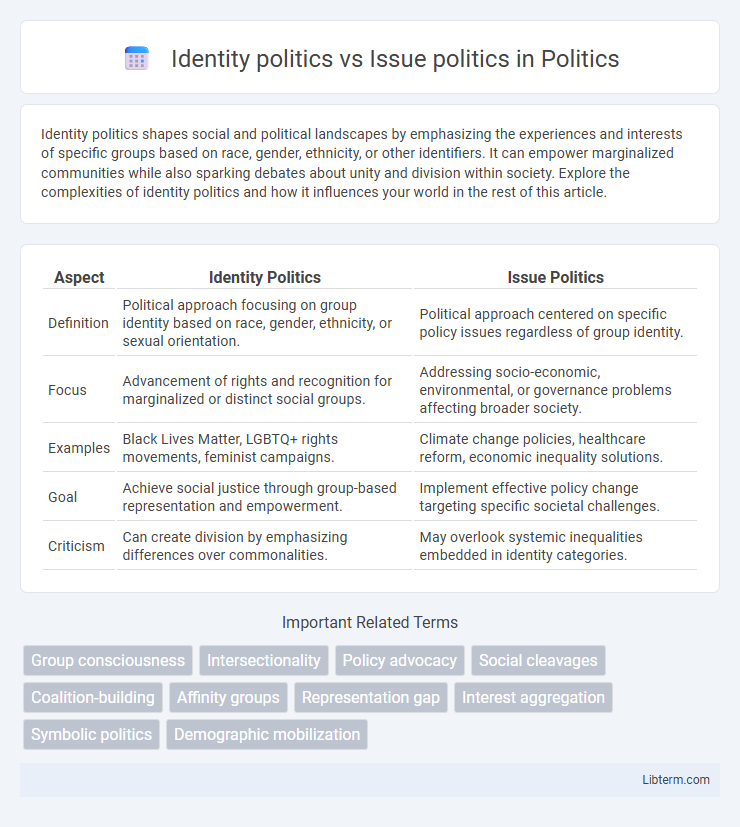Identity politics shapes social and political landscapes by emphasizing the experiences and interests of specific groups based on race, gender, ethnicity, or other identifiers. It can empower marginalized communities while also sparking debates about unity and division within society. Explore the complexities of identity politics and how it influences your world in the rest of this article.
Table of Comparison
| Aspect | Identity Politics | Issue Politics |
|---|---|---|
| Definition | Political approach focusing on group identity based on race, gender, ethnicity, or sexual orientation. | Political approach centered on specific policy issues regardless of group identity. |
| Focus | Advancement of rights and recognition for marginalized or distinct social groups. | Addressing socio-economic, environmental, or governance problems affecting broader society. |
| Examples | Black Lives Matter, LGBTQ+ rights movements, feminist campaigns. | Climate change policies, healthcare reform, economic inequality solutions. |
| Goal | Achieve social justice through group-based representation and empowerment. | Implement effective policy change targeting specific societal challenges. |
| Criticism | Can create division by emphasizing differences over commonalities. | May overlook systemic inequalities embedded in identity categories. |
Understanding Identity Politics
Identity politics centers on advocating for the rights and interests of social groups defined by race, gender, ethnicity, or sexual orientation, emphasizing lived experiences and historical marginalization. It seeks policy changes that address systemic inequalities by highlighting how social identities shape individual and group realities. This approach contrasts with issue politics, which prioritizes universal policy problems over group-specific experiences.
Defining Issue Politics
Issue politics centers on policies and legislative agendas that address broad societal challenges such as healthcare, education, and economic inequality, emphasizing solutions based on data and cross-group consensus. Unlike identity politics, which prioritizes the experiences and rights of specific groups defined by race, gender, or ethnicity, issue politics seeks to build coalitions around shared goals regardless of individual identity. Policy debates in issue politics often focus on measurable outcomes and pragmatic approaches to governance that transcend cultural or demographic divisions.
Historical Backgrounds of Both Approaches
Identity politics emerged prominently during the civil rights movements of the 1960s and 1970s, highlighting the struggles of marginalized groups based on race, gender, and sexuality. Issue politics, rooted in Enlightenment ideals and early democratic theory, centers on policy debates and universal principles such as justice and equality. The historical trajectory of identity politics reveals a shift towards group-based empowerment, while issue politics emphasizes problem-solving through legislative and institutional frameworks.
Key Differences Between Identity and Issue Politics
Identity politics centers on advocating for specific social groups based on shared characteristics like race, gender, or sexuality, emphasizing representation and group-specific rights. Issue politics concentrates on policy matters and broader societal challenges such as healthcare, economic inequality, or environmental protection, seeking solutions that impact the general population. The key difference lies in identity politics prioritizing group identity and experience, while issue politics focuses on collective problem-solving and policy reform.
The Role of Social Movements
Social movements in identity politics mobilize around shared characteristics such as race, gender, or sexuality to address systemic inequalities and promote recognition and rights for marginalized groups. In issue politics, social movements emphasize specific policy changes or reforms, targeting broad societal problems like climate change, healthcare, or economic justice. These movements use collective action and advocacy to influence public opinion and legislative agendas, shaping political discourse through either identity-based solidarity or issue-specific campaigns.
Benefits and Drawbacks of Identity Politics
Identity politics enhances representation for marginalized groups by centering their unique experiences and fostering solidarity, which can lead to more targeted social justice initiatives. However, it risks deepening social divisions and may overlook broader, intersectional issues by emphasizing group identity over common political goals. This approach can empower underrepresented communities but also polarize political discourse, complicating coalition-building across diverse populations.
Advantages and Limitations of Issue Politics
Issue politics prioritizes specific policy matters, promoting focused debate and targeted solutions that appeal across diverse identity groups, which can foster bipartisan support and pragmatic decision-making. However, its limitation lies in sometimes overlooking the lived experiences and systemic inequalities tied to identity, potentially marginalizing those whose issues are inseparable from their social or cultural backgrounds. Issue politics also risks fragmentation when complex social problems require intersectional approaches rather than isolated policy interventions.
Impact on Political Discourse and Policy
Identity politics emphasizes the representation and rights of specific social groups, shaping political discourse by foregrounding lived experiences and systemic inequalities. Issue politics centers on policy solutions and ideological positions, promoting debates focused on practical outcomes and consensus-building. The impact on policy includes identity politics driving targeted reforms addressing group-specific injustices, while issue politics tends to influence broad-based legislative agendas seeking universal applicability.
Case Studies: When Identity and Issues Collide
Case studies such as the Black Lives Matter movement illustrate how identity politics and issue politics intersect, driving social justice reforms and police accountability demands. The LGBTQ+ rights movement similarly combines identity-based advocacy with policy-focused campaigns on marriage equality and anti-discrimination laws. These examples highlight the tension and synergy when identity groups mobilize around specific political and social issues, shaping legislative and cultural change.
Future Trends in Political Organizing
Future trends in political organizing reveal a shift towards integrating identity politics with issue politics, emphasizing intersectionality and coalition-building across diverse social groups. Digital platforms enable targeted mobilization, allowing activists to address specific issues while highlighting the lived experiences of marginalized identities, fostering more inclusive political engagement. Emerging strategies prioritize data-driven campaigns that balance identity representation with policy-driven goals to maximize voter outreach and influence legislative agendas.
Identity politics Infographic

 libterm.com
libterm.com